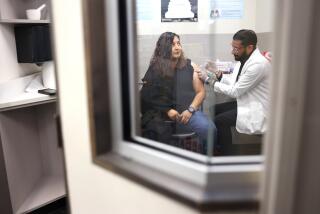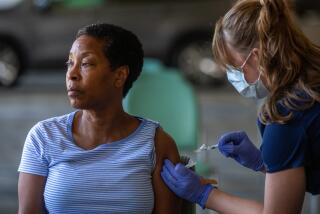Vaccinations Are for Big People Too
- Share via
Vaccinations aren’t just kid stuff. Depending on age and lifestyle, adults should consider asking their doctors about several vaccines that can protect against influenza, pneumonia, hepatitis B and other ailments.
But don’t rely on your physician to bring up the topic, public health officials say. Adult vaccinations are a neglected topic because other issues take precedent during a physical exam.
The best bet? “Ask your doctor what vaccination you need, and when, and if it needs to be repeated,” says Jacqelyn Admire, spokeswoman for the American Academy of Family Physicians.
Experts disagree slightly about which vaccines adults need, but they concur that individual risk factors are important criteria in the decision.
The Premise: Vaccines usually contain a killed or weakened form of the organism they are designed to counteract. When injected, these organisms spur the body to develop antibodies against the invaders, thus making you immune.
Rusty Nail Vaccine: Probably the most overlooked vaccine for adults is the one against tetanus and diphtheria, says Dr. Robert Alan Winters, an infectious-disease specialist at Santa Monica Hospital Medical Center. A booster is recommended every decade, although there is some controversy over whether the 10-year interval is too frequent.
Tetanus is caused by infection of a wound with bacterium often found in soil and manure. Diphtheria, a problem mainly in developing countries, is also a bacterial illness.
Most people ignore the recommendation to update immunizations against tetanus and diphtheria until they encounter a rusty nail.
Admire suggests people remember their tetanus-diphtheria booster “on their zero birthdays” of 30, 40 and so on.
Hepatitis B: Traditionally, hepatitis B--an inflammation of the liver--was considered a risk for homosexual men, intravenous drug users and health-care workers. These days, many other populations are at risk, including sexually active heterosexuals who have multiple partners and those with a history of sexually transmitted diseases.
In the next several years, hepatitis B vaccine will become “part of the standard package,” Winters says.
The hepatitis B vaccine is not cheap. The three-dose regimen, given over a six-month period, costs about $150. A blood test can determine if you already have antibodies and would not need the vaccine.
Measles: If you were born after 1957, you should consider being re-immunized, most experts advise. From about 1963 to 1967, the measles vaccine was ineffective, says Dr. Donald M. Poretz, a spokesman for the National Foundation for Infectious Diseases and an infectious-disease specialist in Fairfax, Va. “If there is any doubt, get another,” he says.
Another alternative: get a blood test to determine if you already have antibodies to measles.
Influenza Vaccine: Government guidelines suggest the influenza vaccine for people over 65 and those with chronic medical conditions, such as heart, lung or immune system problems. But this year, some experts recommend others consider the flu shots as well, because the season is expected to be particularly bad.
Pneumonia Vaccine: Among the elderly, the pneumococcal vaccine is often neglected. The vaccine protects against 23 of the most prevalent types of pneumococcal pneumonia, says Kenneth Keen, a spokesman for Merck & Co., which manufactures a pneumonia vaccine. It is usually a onetime injection. “People can get flu and pneumonia injections at the same office visit,” Keen adds.
Mumps Vaccine: Some adults might need protection against mumps. “Mumps is no longer just a disease of childhood,” says Kay Golan, spokeswoman for the federal Centers for Disease Control and Prevention. “Many cases now occur in teens and young adults”--people who did not come down with mumps as children and who may not have been vaccinated. Generally, she adds, people born before 1957 are immune because they have had mumps.
Rubella Shots: Adults not vaccinated against rubella (German measles) as children should consider getting that vaccine, Golan says. The advice is especially critical for women of childbearing age.
Chicken Pox: Chicken pox, a viral disease, is usually mild in children but can be severe in adults. A vaccine is awaiting approval by the Food and Drug Administration.
Travel Notes: Travelers abroad should be especially careful to keep their vaccination for diphtheria, pneumonia and hepatitis B current. Diphtheria and hepatitis B are prevalent in many foreign countries. And there has been an increase in antibiotic-resistant strains of pneumonia abroad.
*
Doheny cannot answer mail personally but will attempt to respond in this column to questions of general interest. Please do not telephone. Write to Your Body, View Section, Times Mirror Square, Los Angeles, Calif. 90053.






